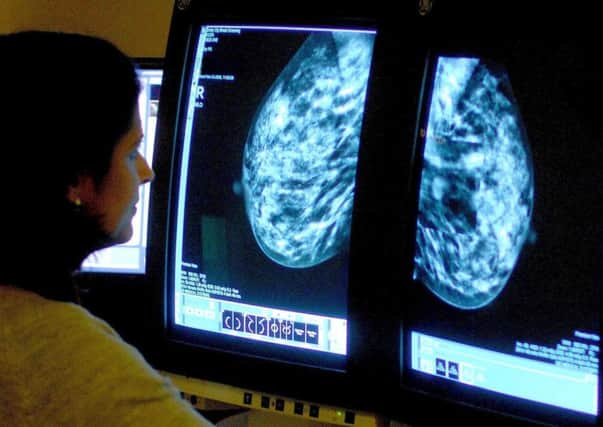Millions ‘unaware’ of breast cancer symptoms


A poll for the charity Breast Cancer Care found many women were unaware of signs of breast cancer other than lumps.
One in three of the 1,100 women surveyed said they did not check their breasts regularly.
Advertisement
Hide AdAdvertisement
Hide AdMost, 96 per cent, knew a lump should always be checked but more than a third, 39 per cent, did not know to look out for redness or a rash on the breast or nipple.
More than a quarter, 28 per cent, did not know that a nipple becoming inverted can be a symptom while 23 per cent were unaware that nipple discharge can be a warning sign.
Samia al Qadhi, chief executive of Breast Cancer Care, said: “This poll shows that, although women know to look out for a lump, many are still worried about how to check their breasts and don’t know what other symptoms to be aware of. There’s no correct way to check - whatever your age, it’s about looking at and feeling your breasts in a way that’s comfortable and convenient for you.”
The poll also found that a fifth of women who did not check their breasts did not do so because they were unsure of how to do it properly. While NHS advice is available to guide women on how to check their breasts, experts agree the most important thing to do is carry out any check, ideally every four to six weeks.
Advertisement
Hide AdAdvertisement
Hide AdMeanwhile, a fifth, 19 per cent, of women in the survey aged 45 to 54 said they were worried about what they may find, despite the fact this is the age when risk increases. Some 11 per cent of women aged 55 and over who did not check were relying on three-yearly mammograms.
Ms al Qadhi said: “It’s totally understandable that the thought of receiving a breast cancer diagnosis can be very frightening. But we know that earlier detection can mean more effective treatment. So, make today the day you start getting to know your breasts, even before you need screening or between appointments, so you can spot any unusual changes quickly.”
In 2011, more than 50,000 women in the UK were diagnosed with breast cancer and about 11,000 died of the disease.
In July, Public Health England (PHE) launched a campaign to raise awareness of breast cancer symptoms among older women after finding many were unaware of symptoms other than lumps.
Advertisement
Hide AdAdvertisement
Hide AdOne in three women diagnosed with breast cancer each year are aged 70 and over, but PHE found that half of this age group could not name a symptom other than a lump when asked.
Evidence shows that despite older women being at an increased risk of breast cancer, they are also more likely to delay going to their GP with symptoms.
The Be Clear on Cancer campaign, which is supported by former tennis champion Virigina Wade, aims to reinforce the message “don’t assume you’re past it”, urging older women to visit their doctor straight away if they notice any unusual or persistent changes to their breasts.